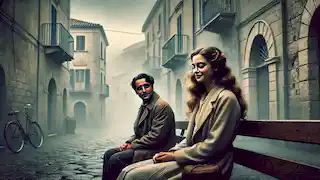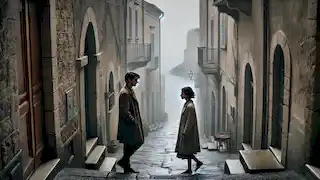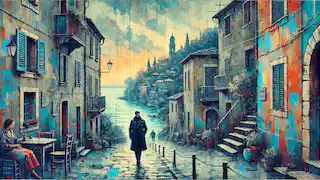*Spring in Fialta* is a tale of fragmented encounters, a chronicle of a chance meeting between the narrator and his recurring, elusive lover, Nina. Set against the backdrop of a gray, ephemeral Fialta, the story unfolds in a fog of nostalgia, fragmented memories, and melancholy. Nabokov deftly navigates the realms of memory, exploring the nature of time, attachment, and loss in a way that only he can. This retelling captures the essence of that fleeting love affair, bringing forth the subtle emotions that linger just beyond the surface.
Fialta was draped in a kind of sluggish dampness as I arrived, a city by the sea where spring always seemed to come only halfway. The air, heavy and gray, hung around the town like a curtain not fully drawn, and even the people moved in a slow dance, impervious to the sense of renewal that spring is supposed to bring. I had come there on business—my wife was elsewhere, and the town of Fialta, though I had been there before, seemed like an appropriate escape from everything that cluttered my daily life.
But it was Nina—Nina again—who found me in that pale, transient town.

Our paths had crossed numerous times before, at intervals too infrequent to be considered part of a continuous relationship, and yet each encounter brought back the same flow of emotions I had thought forgotten. Nina, the elusive, ephemeral Nina, was married now to a man named Ferdinand, a playwright, whose sallow skin and indifference seemed to wrap around him like an old, worn coat.
I had never loved Nina the way a man loves his wife, not really. Or perhaps, in a sense, I had—but she was not someone you could truly possess. She was too restless, too unpredictable, too light in spirit to be tethered by any formal union, whether to me or to Ferdinand. And yet, there she was, again and again, floating in and out of my life as easily as the fog in Fialta—neither entirely present nor entirely absent.
Nina smiled when she saw me that day, the same enigmatic smile that had always confused me. I couldn’t tell if it was meant for me alone or for the world around her. She looked like she always did—perhaps a little older, but still with that playful, unguarded charm that had once captivated me so long ago. Her hair fell across her shoulders like a wave caught in mid-motion, and her hands—delicate, always moving—rested lightly on the back of a wooden bench where we sat for a while.
I hadn’t expected to see her, of course. Fialta was not a place where people like her belonged. It was too dreary, too passive for someone so full of life. But there she was, a splash of color against the muted backdrop of a town perpetually caught between seasons.
We spoke of trivial things at first—weather, travel, mutual acquaintances. Ferdinand was off somewhere, she said, working on a new play, and I got the sense that her words weren’t meant to fill me in on the details of her life, but rather to fill the empty spaces in the conversation. There was always something unsaid between us, something that hovered in the air, unresolved and waiting.
After a while, Nina suggested we walk, and so we did—through the narrow streets of Fialta, past shuttered shops and cafes that were only half-open, as if the town itself hadn’t yet decided whether to fully embrace the coming season. The grayness of the day seemed to suit our mood, not oppressive but distant, allowing us the space to move without commitment.
As we walked, I found myself studying her closely. Time had not eroded her beauty, but it had changed her in ways I couldn’t quite articulate. She was still light on her feet, still possessed of that same, almost childlike, grace—but there was a faint melancholy about her now, a weight to her that I hadn’t noticed before. Perhaps it was the inevitability of aging, or perhaps it was something else—something to do with the passing years, the unspoken decisions we had both made.
At some point, we reached the edge of town, where the sea stretched out in front of us, vast and indifferent. Nina stopped and gazed at the water, her face unreadable, and I, too, paused, unsure of what to say next. Words seemed irrelevant in that moment; they wouldn’t capture what was hanging between us anyway.
“Do you ever think about it?” she asked suddenly, turning to face me.
“About what?” I responded, though I knew what she meant.
“About us,” she said, almost wistfully. “About what might have been.”
I hesitated, not because I didn’t know the answer, but because the answer was too complicated to express. Of course, I thought about it. How could I not? But there was no simple way to encapsulate what had passed between us. It had been fleeting, yes, but it had also been profound in its own way—profound because it was fleeting.
“I do,” I said finally. “But I don’t think it would have changed anything.”
Nina smiled again, the same enigmatic smile that always seemed to be hiding something. “No, I suppose not,” she said, and then she turned back to the sea, her hands tucked into the pockets of her light coat.
We stood there in silence for a while, the wind brushing softly against our faces. I thought about all the times we had crossed paths—how each encounter had been brief, almost accidental, yet imbued with a strange significance. It was as though the universe had conspired to keep us apart, but only just enough to make us wonder what could have been.
Eventually, we turned and began to walk back into town. Nina talked again, this time about her life with Ferdinand, though her words felt disconnected, as if she were describing someone else’s existence. I wondered if she was happy with him, but I didn’t ask. It wasn’t my place to know, and besides, happiness had never seemed to be her goal.
As we walked, I realized that our time together was coming to an end once again. It always did, and yet I never quite grew accustomed to it. I wondered when I would see her again—if I would see her again. But such thoughts were pointless. Nina was like a passing storm, brief and intense, and trying to predict her next appearance was as futile as trying to capture the wind.

Eventually, we came to a small cafe, one I remembered from my previous visits to Fialta. We sat outside, under a canopy that did little to keep out the grayness of the day, and ordered coffee. Nina seemed distant now, her mind wandering somewhere far away, and I couldn’t help but feel a pang of regret—regret not for what had happened, but for what hadn’t. There was always something unfinished about our relationship, something that never quite reached its conclusion.
After a while, Nina looked at her watch and sighed. “I should go,” she said softly. “Ferdinand will be wondering where I am.”
I nodded, not knowing what else to say. We stood up, and she leaned in to kiss me on the cheek, her lips brushing against my skin in the same familiar, delicate way they always had. “Goodbye,” she whispered, and then she turned and walked away, disappearing into the fog that seemed to swallow up the entire town.

I watched her go, knowing that this would likely be the last time I saw her. There was something final about this encounter, though I couldn’t quite place what it was. Perhaps it was the way she had looked at me—soft, but resigned. Or perhaps it was simply that we had reached the end of whatever strange connection had bound us together for so many years.
As I sat back down at the cafe, alone now, I found myself thinking about Fialta—not just the town, but what it had come to represent for me. It was a place of transience, of half-formed memories and fleeting moments, a place where nothing ever seemed to take root. And yet, for all its grayness, there was a certain beauty to Fialta, a beauty that lay not in its scenery but in its impermanence.
I thought about Nina as I sipped my coffee, about all the times our paths had crossed, all the moments we had shared. They were fragments, really—pieces of a puzzle that would never fully come together. But maybe that was the point. Maybe some relationships were meant to remain unfinished, incomplete. Maybe that was where their true beauty lay.
I finished my coffee and stood up, feeling the weight of the day pressing down on me. As I walked back through the streets of Fialta, the fog began to lift ever so slightly, revealing glimpses of blue sky beyond. But it was only a glimpse, a brief suggestion of what could be, before the grayness closed in again.
And so I left Fialta, as I always did, with the sense that something important had slipped through my fingers once more.

















